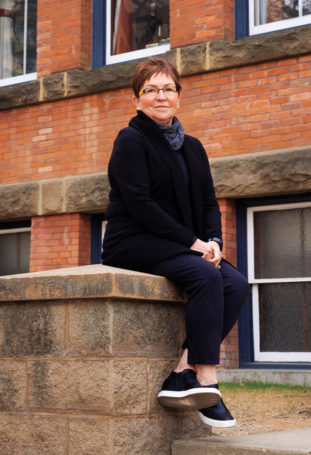June 11, 2021
After decades spent supporting youth development, two women have created legacies that will help local youth reach their full potential for years to come
If there is one word to describe the legacy that Fran Papworth has created in the community, it would be “joy.” Throughout her life, she has generously given her time to local causes, particularly those that open doors for children in Edmonton. Whether collecting school supplies for kids in need, volunteering with 630 CHED Santas Anonymous or developing a pen-pal program that paired local students with employees at TELUS, Papworth has touched thousands of lives through her volunteer work.
“I’ve always volunteered. It’s one of those things that when you start, you can’t stop,” she says. “But I guess you could say I got a little more gung-ho with it when I retired.”

These days, when she’s not helping organize volunteer opportunities for other retirees, she still manages to find time to attend online school with one of her granddaughters three days a week. But Papworth’s passion for children’s education extends well outside of the Grade 2 classes she’s been attending as of late.
“I’d say about 80 per cent of my volunteering involves kids,” she says. “Early education is so important, and I think sometimes we lose sight of that.”
So when Papworth’s friend and former neighbour, Larry Anderson, suggested creating an Endowment Fund with Edmonton Community Foundation in her name, she naturally chose to support youth education programs.
“I had been to a fundraiser breakfast for the Edmonton Public School Foundation, and was so impressed by the work they’d been doing to open full-day kindergarten in schools across the city,” she says. “So we sat down with the Foundation and looked at ways to support their work.”
In 2010, the Fran Papworth Opportunity for Joy Endowment Fund was established with the goal of funding arts, cultural and education programs for youth in need. In the years since, it has been used to support a variety of educational initiatives and opportunities that kids might not otherwise be able to access.
“The money that’s going through this fund is so worthy and so needed to give these kids the chance to learn and have a bright future,” she says. “There are children whose parents are learning English, or who are working more than one job, who don’t have resources to do these kinds of activities. For them, this funding is needed now more than ever.”
Although she’s long since left the classroom behind, Judy Craig remains as committed to children’s education as ever. After a decades- long career specializing in diagnostic reading and supporting children with learning disabilities, Craig has settled into retirement but remains well connected to local school boards.

Craig’s story began decades earlier, in a Grade 5 classroom in Chicago, Illinois. As a novice teacher with a bustling class of 37 students, she had her hands full. That didn’t stop her from focusing extra energy on one student in particular: a young boy named Billy, who struggled to read the most basic words but seemed to do well in conversation and other kinds of classroom work.
“As a teacher, I thought, ‘I’m going to fix this.’ As my class was working on things, I’d take him to the back of the room and try to work with him. To my surprise and regret, although I did try, when you have 36 other children you just don’t have enough time to work one-on-one to the degree they need,” she says. “It was that experience with that boy that set the course for the rest of my career. If I couldn’t teach that boy to read, I felt I had no business being a teacher.”
Years later, as a result of her experience with Billy, Craig returned to school to complete a Masters degree in Diagnostic Reading at the University of Alberta.
“These kids learn differently, but that doesn’t mean they can’t learn,” she says. “Different kids may require different approaches. You just have to figure out how their brains work and give them tools and strategies that work for them.”
She became involved with the Learning Disabilities Association of Alberta, a parent organization that fights for better programming to support children with deficits in reading, writing, math or other studies. Eventually, Craig stepped into the role of principal at the Academy at King Edward, a school offering specialized programming to meet the needs of students like Billy. It was through this work that she came to meet Larry Anderson.
“Larry understood I was really interested in kids who were struggling and learned differently. One day he said to me, ‘I want to recognize teachers who are doing exceptional work for children with learning disabilities’,” she says.
Thus, Larry established the Judy Craig Professional Development Award at Edmonton Community Foundation. The award offers teachers in Edmonton-area school districts (including Edmonton, St. Albert and Elk Island) funding to support professional development or classroom resources to support children with learning disabilities. As classrooms have evolved in response to the COVID-19 pandemic, so have the needs for these kinds of supports.
“Unfortunately, with the onset of the pandemic last year, we weren’t able to select a recipient as we normally would have,” says Craig. “But these children still need support, and I know teachers are still doing their best to provide it, so I hope we can get back to it.”